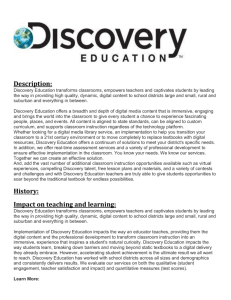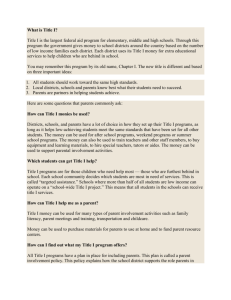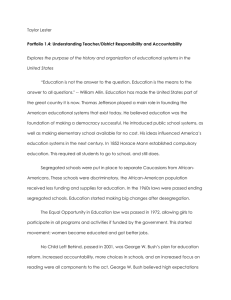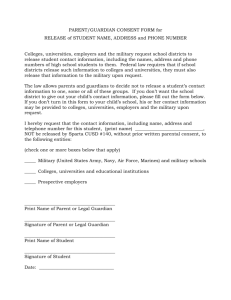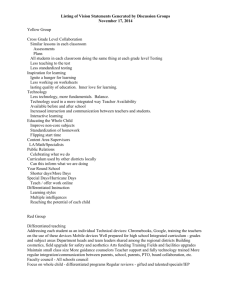Training - People Server at UNCW
advertisement
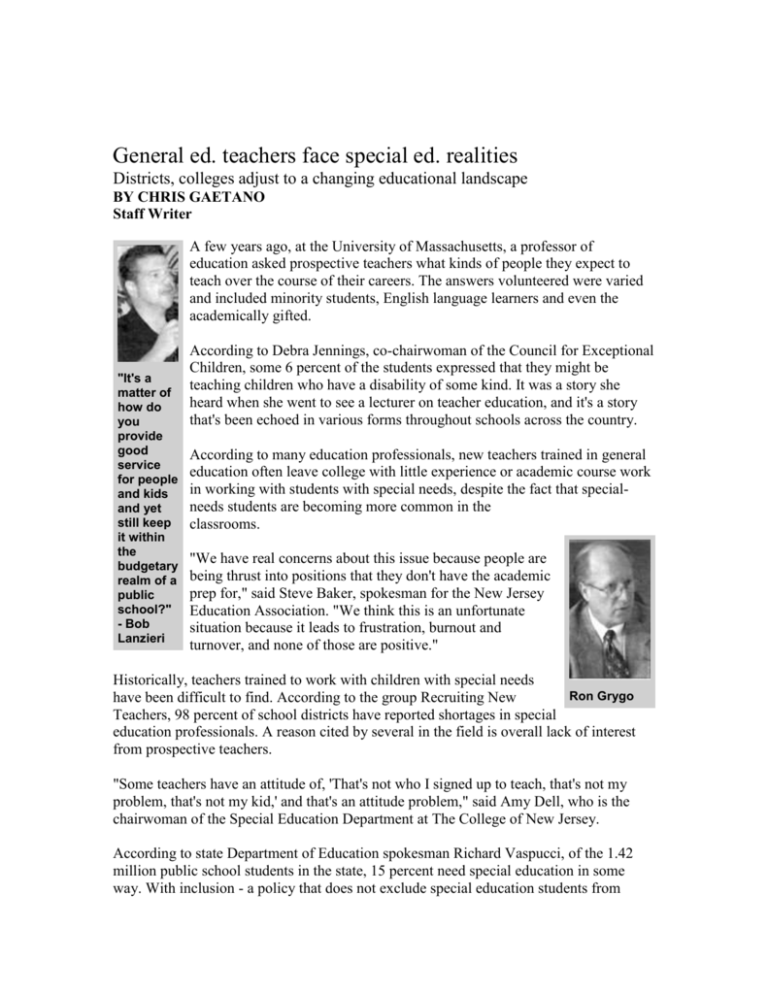
General ed. teachers face special ed. realities Districts, colleges adjust to a changing educational landscape BY CHRIS GAETANO Staff Writer A few years ago, at the University of Massachusetts, a professor of education asked prospective teachers what kinds of people they expect to teach over the course of their careers. The answers volunteered were varied and included minority students, English language learners and even the academically gifted. "It's a matter of how do you provide good service for people and kids and yet still keep it within the budgetary realm of a public school?" - Bob Lanzieri According to Debra Jennings, co-chairwoman of the Council for Exceptional Children, some 6 percent of the students expressed that they might be teaching children who have a disability of some kind. It was a story she heard when she went to see a lecturer on teacher education, and it's a story that's been echoed in various forms throughout schools across the country. According to many education professionals, new teachers trained in general education often leave college with little experience or academic course work in working with students with special needs, despite the fact that specialneeds students are becoming more common in the classrooms. "We have real concerns about this issue because people are being thrust into positions that they don't have the academic prep for," said Steve Baker, spokesman for the New Jersey Education Association. "We think this is an unfortunate situation because it leads to frustration, burnout and turnover, and none of those are positive." Historically, teachers trained to work with children with special needs Ron Grygo have been difficult to find. According to the group Recruiting New Teachers, 98 percent of school districts have reported shortages in special education professionals. A reason cited by several in the field is overall lack of interest from prospective teachers. "Some teachers have an attitude of, 'That's not who I signed up to teach, that's not my problem, that's not my kid,' and that's an attitude problem," said Amy Dell, who is the chairwoman of the Special Education Department at The College of New Jersey. According to state Department of Education spokesman Richard Vaspucci, of the 1.42 million public school students in the state, 15 percent need special education in some way. With inclusion - a policy that does not exclude special education students from general education classes - being emphasized more and more, children with special needs are becoming more common in classrooms where teachers, who, due to lack of interest, may not have had experience in addressing their needs. "It's not a reflection on the school systems, it's a reflection on our teacher prep programs that teachers are not being prepared for the reality of the classrooms," said Jennings. "No teacher should be surprised that there's a student with disabilities in their class." Colleges begin to adjust This is a problem that colleges have been seeking to rectify and over the past few years, more and more have been weaving special education training into their curriculums. Many of these changes have been spurred on by recent changes in the reauthorized Individuals with Disabilities Education Act, which has led to a greatly increased emphasis on inclusion. Revisions within the past decade has led to educational institutions, the state and the nation attempting to quickly catch up to a new paradigm, according to Vaspucci. However, this has not been without difficulty. According to Dell, sometimes in-depth training is required to assist students with special needs, and while teacher training may now include some course work on special education, it lacks depth. This could be due, however, to teaching institutions needing to fulfill so many requirements. "This is actually a problem that all teacher education programs face," Dell said. "They have to meet requirements that are set by state licensing offices, they have to meet accreditation requirements, they have to meet college requirements, so they're being pulled in a lot of directions. And as a result, many programs do not provide in-depth training in teaching kids with disabilities. ... There's no depth in that, because there's no room in the program." Terri Rothman, the chairwoman of the Education Leadership and Special Education Department at Monmouth University, agrees. However, she added that because the field of special education is so vast, providing comprehensive training, in addition to a teacher's general education training, is difficult. "To deal with all the different types of potential disabilities you might find in the class, there's no way that a general education teacher can have intensive training in all those areas," said Rothman. The end result of this has been, despite more schools increasing their emphasis on attending to students with special needs, many prospective teachers possess only a cursory knowledge of attending to those same students. "I think, in general, it's fair to say that there's not adequate preparation for teaching kids with learning problems and special needs, and I do think that's part of the problem," said Dell. Accreditation institutions also address standards in teacher training and demand that any teacher, whether general or special education, know how to accommodate students with special needs. "We do have standards, and the standards do expect our accredited institutions to provide work for candidates with students in exceptional populations," said Jane Leibbrand, of the National Council for Accreditation of Teacher Education. According to Leibbrand, that work may not necessarily include academic course work, but at least some familiarity is mandated. "Frankly, in today's world, it's not that difficult because if you go into any middle school ... there may be eight to 10 students out of 30 with some type of disability, and this is a regular classroom in, say, a middle school," said Leibbrand. Budgetary problems Another observation from professionals is that education faces budget cuts across all lines, and special education is no exception. "The spread of who gets what where; it's not because people don't want to do it, it's a matter of school districts investing in stuff. And on top of all that, special education is only a small part of it," said Bob Lanzieri, the founder of the Brick-based advocacy group Parents of Autistic Children. "It's a matter of how do you provide good service for people and kids and yet still keep it within the budgetary realm of a public school?" Lanzieri's organization tries to improve this situation by providing workshops on addressing the needs of people with special needs and helping take the burden off the districts to further train teachers. "If the burden, if the onus, is not on one district all the time and sort of spread out, then it becomes a more appealing, sensible way to do things, as opposed to just saying, 'East Brunswick, you have to train more teachers and that's it,' which puts a burden on them," said Lanzieri. Districts preparing their own Offering professional development opportunities for teachers both young and old is one way many districts have been addressing shortages in those trained in special education. If teachers are going to be in a classroom with special-needs students without training in special education, many districts will train that teacher either on the job or during the summer. It is something that the South Brunswick School District has done for no small number of years. "They've received training here, aside from the training they've had from their education. We've also provided strong inclusion in-class support training at the district level as well, and we continue to do that," said Carol Piza, the coordinator of special education in the district. Piza noted that the district has also developed strong relationships with local colleges to ensure that their pool of special education professionals does not run short. South Brunswick has 970 special education students enrolled, who are attended to by 65 special education teachers. In South River, the district offers voluntary professional development for those who might need additional training in helping students with special needs. "What we try to do is have the teachers themselves assess their needs, and at that point we have the tools both within and without the district to allow them to get the training they need," said South River Superintendent of Schools Ron Grygo. Both Grygo and Piza also talked about supporting general education teachers with special education professionals when they might not have sufficient knowledge to help specialneeds students. This is a common feature of inclusion classrooms, and helps ameliorate difficulties general education teachers might have. "I think [more comprehensive education for special-needs students] can be accomplished in formal ways by workshops and course work, but it's also good to have a way for general education teachers to get support on the job with possibly a special education teacher," said Kristen Reedy, of the Northeast Regional Resource Center, a support network for special education professionals. Recognizing a need Recognition of the need for more flexible teachers has also spurred the state into action. According to John Zlock, a spokesman for the state Department of Education, the state recently mandated that all teachers be well-versed in all facets of education, including special education. The specifics of how districts will do this is left up to local school boards, though the plan needs to be approved by the county superintendent. "In other words," said Zlock, "a general education teacher would be expected to receive special education training if he/she is teaching in an inclusive classroom." This act reflects the further emphasis on special education that the state, nation and educational institutions have been attempting to quickly digest. According to Vaspucci, there is an increasing number of colleges requiring at least basic knowledge of special education. According to Piza, especially in today's classrooms, this makes new teachers more attractive hires as districts emphasize inclusion. "The colleges and universities really have prospective teachers doing inclusion because if they didn't, they wouldn't be strong candidates for hire," said Piza.
